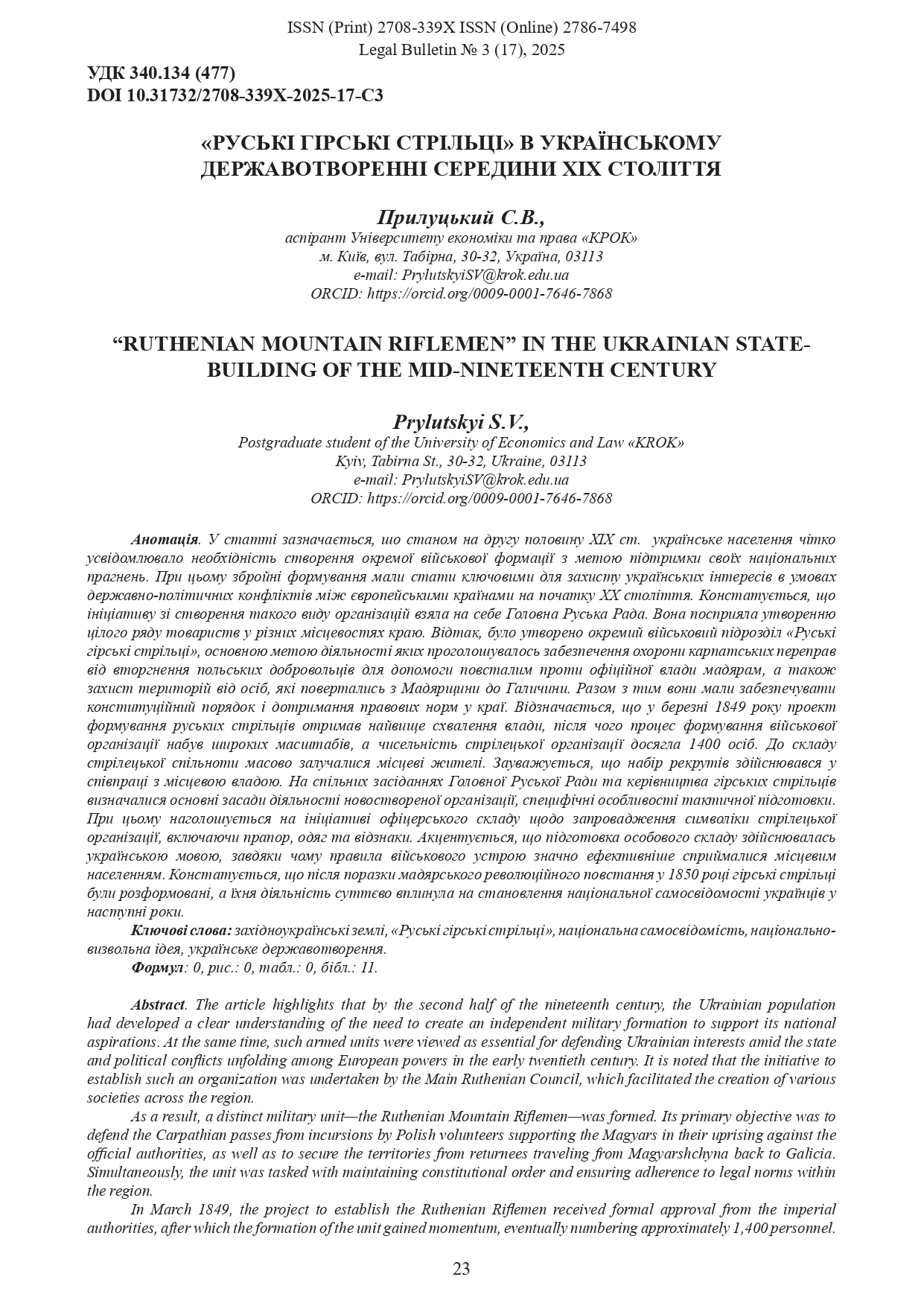«РУСЬКІ ГІРСЬКІ СТРІЛЬЦІ» В УКРАЇНСЬКОМУ ДЕРЖАВОТВОРЕННІ СЕРЕДИНИ ХІХ СТОЛІТТЯ
DOI:
https://doi.org/10.31732/2708-339X-2025-17-C3Ключові слова:
західноукраїнські землі, «Руські гірські стрільці», національна самосвідомість, національно- визвольна ідея, українське державотворенняАнотація
У статті зазначається, шо станом на другу половину ХІХ ст. українське населення чітко усвідомлювало необхідність створення окремої військової формації з метою підтримки своїх національних прагнень. При цьому збройні формування мали стати ключовими для захисту українських інтересів в умовах державно-політичних конфліктів між європейськими країнами на початку ХХ століття. Констатується, що ініціативу зі створення такого виду організацій взяла на себе Головна Руська Рада. Вона посприяла утворенню цілого ряду товариств у різних місцевостях краю. Відтак, було утворено окремий військовий підрозділ «Руські гірські стрільці», основною метою діяльності яких проголошувалось забезпечення охорони карпатських переправ від вторгнення польських добровольців для допомоги повсталим проти офіційної влади мадярам, а також захист територій від осіб, які повертались з Мадярщини до Галичини. Разом з тим вони мали забезпечувати конституційний порядок і дотримання правових норм у краї. Відзначається, що у березні 1849 року проект формування руських стрільців отримав найвище схвалення влади, після чого процес формування військової організації набув широких масштабів, а чисельність стрілецької організації досягла 1400 осіб. До складу стрілецької спільноти масово залучалися місцеві жителі. Зауважується, що набір рекрутів здійснювався у співпраці з місцевою владою. На спільних засіданнях Головної Руської Ради та керівництва гірських стрільців визначалися основні засади діяльності новоствореної організації, специфічні особливості тактичної підготовки. При цьому наголошується на ініціативі офіцерського складу щодо запровадження символіки стрілецької організації, включаючи прапор, одяг та відзнаки. Акцентується, що підготовка особового складу здійснювалась українською мовою, завдяки чому правила військового устрою значно ефективніше сприймалися місцевим населенням. Констатується, що після поразки мадярського революційного повстання у 1850 році гірські стрільці були розформовані, а їхня діяльність суттєво вплинула на становлення національної самосвідомості українців у наступні роки.
Посилання
Vpershe ofitsiyni viyskovi komandy ukrayinskoyu zafiksuvaly 175 rokiv tomu: shcho slid znaty pro
Batalion ruskykh hirsʹkykh strilʹtsiv. URL: https://armyinform.com.ua/2024/03/10/vpershe-oficzijni-vijskovi-
komandy-ukrayinskoyu-zafiksuvaly-175-rokiv-tomu-shho-slid-znaty-pro-bataljon-ruskyh-girskyh-strilcziv/(accessed:
07.2025).
Holovna Rusʹka Rada (1848-1851): protokoly zasidanʹ i knyha korespondentsiyi / Edited by O. Turiya, compilers
U. Kryshtalovych and I. Svarnyk. Lviv: Instytut Istoriyi Tserkvy Ukrayinsʹkoho Katolytsʹkoho Universytetu, 2002. P.
XXXIV, 1-270.
Zabzalyuk D., Kohut Ya. Do pytannya formuvannya ukrayinsʹkoho viyskovoho dukhoventstva. Derzhavotvorennya
ta pravotvorennya v umovakh viyny ta pislyavoyennyy period: zbirnyk tez dopovidey uchasnykiv Vseukrayinsʹkoho
krugloho stolu (Lviv, 12 hrudnya 2024 roku) / Editors: D.Ye. Zabzalyuk, R.Ya. Demkiv. Lviv: Lviv State University of
Internal Affairs, 2024. P. 84-87.
Istoriya ukrayinsʹkoho viyska. Winnipeg: I. Tykor, 1953. P. 1-838.
“Rusʹkyy batalʹyon hirsʹkykh strilʹtsiv”: pershyy viysʹkovyy pidrozdil pid synʹo-zhovtym praporom.
URL:https://telegra.ph/Ruskij-bataljon-g%D1%96rskih-str%D1%96lc%D1%96v-pershij-v%D1%96jskovij-
p%D1%96drozd%D1%96l-p%D1%96d-sino-zhovtim-praporom-08-23 (accessed: 08.07.2025).
Krevetsʹkyy I. Batalion ruskykh hirsʹkykh strilʹtsiv, 1849-1850. Zapysky NTSH. Lviv: Druk NTSH, 1912. Vol.
CVII. P. 52-73.
Lazarovych M.V. Lehion Ukrayinsʹkykh sichovykh strilʹtsiv: formuvannya, ideya, borotʹba. Ternopil: Dzhura,
P. 1-592.
Tyshchyk B., Novosyadlo I. Ukrayinsʹki sichovi strilʹtsi
–
zarodok natsionalʹnykh zbroynykh syl novitʹkoho
chasu (do 105-richchya utvorennya lehionu ukrayinsʹkykh sichovykh strilʹtsiv). Visnyk Lʹvivsʹkoho universytetu. Series:
Law. 2019. Issue 69. P. 51-66.
Ukrayinsʹka Halytsʹka Armiya. U 40-richchya yiyi uchasti u vyzvolʹnykh zmahannyakh (materialy do istoriyi).
Winnipeg: Khoryunzhyy USS D. Mykytyuk, 1958. P. 1-674.
Chmyr M., Pinak Ye., Muzychuk S. Halytsʹka Armiya, 1918-1920. Rivne, 2008. P. 1-80.
Shtefan A. Ukrayinsʹke viysʹko v Zakarpatti. Toronto-New York, 1969. P. 1-28.

Downloads
Опубліковано
Як цитувати
Номер
Розділ
Ліцензія
Авторське право (c) 2025 Прилуцький С.В.

Ця робота ліцензується відповідно до Creative Commons Attribution 4.0 International License.




